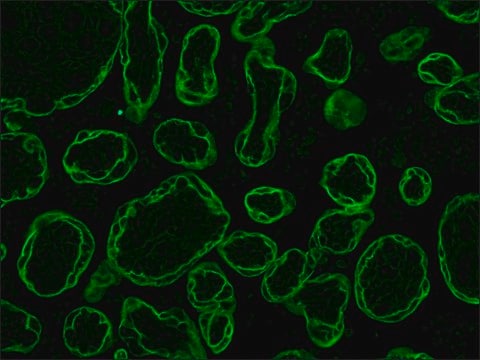C4562
Monoclonal Anti-Caldesmon (Smooth) antibody produced in mouse
clone hHCD, ascites fluid
Synonyme(s) :
Anti-CDM, Anti-H-CAD, Anti-HCAD, Anti-L-CAD, Anti-LCAD, Anti-NAG22, Anti-h-CD
Sélectionner une taille de conditionnement
Sélectionner une taille de conditionnement
About This Item
Produits recommandés
Source biologique
mouse
Niveau de qualité
Conjugué
unconjugated
Forme d'anticorps
ascites fluid
Type de produit anticorps
primary antibodies
Clone
hHCD, monoclonal
Contient
15 mM sodium azide
Espèces réactives
sheep, rabbit, human, pig, bovine, mouse
Technique(s)
immunohistochemistry: 1:500 using methacarn-fixed, paraffin-embedded sections of human or animal tissue
immunoprecipitation (IP): suitable
western blot: 1:4,000 using human uterus extract
Isotype
IgG1
Numéro d'accès UniProt
Conditions d'expédition
dry ice
Température de stockage
−20°C
Modification post-traductionnelle de la cible
unmodified
Informations sur le gène
human ... CALD1(800)
mouse ... Cald1(109624)
Spécificité
Immunogène
Application
Immunohistochemistry (1 paper)
Western Blotting (1 paper)
- immunohistochemistry at a dilution of 1:500 using methacarn-fixed, paraffin-embedded sections of human or animal tissue
- immunoprecipitation
- western blot at a dilution of 1:4,000 using human uterus extract
Actions biochimiques/physiologiques
Clause de non-responsabilité
Vous ne trouvez pas le bon produit ?
Essayez notre Outil de sélection de produits.
Code de la classe de stockage
10 - Combustible liquids
Classe de danger pour l'eau (WGK)
nwg
Point d'éclair (°F)
Not applicable
Point d'éclair (°C)
Not applicable
Faites votre choix parmi les versions les plus récentes :
Certificats d'analyse (COA)
Vous ne trouvez pas la bonne version ?
Si vous avez besoin d'une version particulière, vous pouvez rechercher un certificat spécifique par le numéro de lot.
Déjà en possession de ce produit ?
Retrouvez la documentation relative aux produits que vous avez récemment achetés dans la Bibliothèque de documents.
Filtres actifs
Notre équipe de scientifiques dispose d'une expérience dans tous les secteurs de la recherche, notamment en sciences de la vie, science des matériaux, synthèse chimique, chromatographie, analyse et dans de nombreux autres domaines..
Contacter notre Service technique








